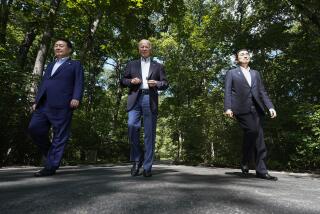Coalition Puts Unity to the Test
- Share via
WASHINGTON — At home and abroad, the Sept. 11 attacks on the World Trade Center and the Pentagon have forged a remarkably diverse coalition behind President Bush’s pledge to “root out” global terrorism.
But having assembled that coalition, Bush now faces a gantlet of decisions that will test what he is willing to concede in order to maintain it.
In dealing both with Congress and the international alliance he has rapidly assembled, Bush is confronting a fundamentally similar choice: How much will he moderate his own preferences to sustain unity?
On domestic issues, the critical choice is how much Bush uses the leverage of his soaring popularity to bend Congress toward his will on issues ranging from the airport security plan he unveiled Thursday to the shape of any future economic stimulus package. Diplomatically, the key question is how much Bush narrows the focus of any military action solely toward Saudi militant Osama bin Laden in deference to the fears, particularly among Islamic states, of a wider war.
This delicate balancing of both domestic and foreign sensibilities places Bush in a new, even ironic, role: Until the attack, critics frequently accused him of a “cowboy mentality” that prized unilateral action and ignored contrasting views on a variety of decisions, from his tax cut to his rejection of the Kyoto treaty on global warming.
So far, the administration has sent conflicting signals on how much it might bend American aims in the name of unity.
Secretary of State Colin L. Powell has publicly emphasized the importance of maintaining a broad international coalition: “If we want to go it alone and say, ‘We know what’s best in all of these cases’ . . . and lose the support of the world, then I think we will have made a strategic mistake.”
But Defense Secretary Donald H. Rumsfeld has argued precisely the opposite: “The mission determines the coalition,” he has said repeatedly, “and the coalition must not be permitted to determine the mission.”
‘It’s a New Kind of Washington’
Similar, if not quite as sharp, divisions are evident on the domestic front. Both the White House and congressional Democrats are uncertain how to express their continuing disagreements on domestic issues, such as the federal role in airport security, without undermining their newfound solidarity about the war against terrorism.
“This is not just a new kind of war; it’s a new kind of Washington,” said one senior White House official. “I think we are trying to feel our way as to how and when to press these other issues.”
In both the domestic and foreign arenas, a panoramic alliance has rapidly assembled to confront the terrorist threat.
At home, Bush won almost immediate congressional approval--with only a single dissenting vote--of a resolution authorizing the use of force against the terrorists who staged the Sept. 11 attacks. After months of partisan sparring, he has built a strong personal relationship in recent days with Senate Majority Leader Tom Daschle (D-S.D.) and House Minority Leader Richard A. Gephardt (D-Mo.). Abroad, the surge of support--from Russia and China to the NATO members--has been almost as remarkable.
Yet all of this support, domestic and international, carries a price: Maintaining such a broad coalition can require compromise and concession on many fronts.
Large Mission, Narrow Target
So far, that dynamic has been highlighted most clearly by the debate within the administration over the scope of the retaliation. Initially, Rumsfeld and his allies argued for a broad campaign against not only Afghanistan but other states suspected of supporting terrorism, principally Iraq. But Bush sided with Powell, who backed a phased effort initially focused on Bin Laden and his sponsors in the Taliban government of Afghanistan.
Some sources say Bush’s decision was heavily influenced by Powell’s argument that the narrower the mission, the broader the international coalition the United States could assemble. One senator in close touch with the administration said Bush reached that conclusion himself as he spoke with a succession of world leaders in the first few days after the attack.
“The president was at that time working through in his own mind how he was going to be able to harness all of this support,” the senator said. “And he realized you have a large, disparate group of interests out here--China, Russia--and it would require a narrowly targeted mission to keep them together.”
Too narrowly targeted, say some conservative critics, who want Bush to seize this moment to attack other states that have previously supported terrorism, such as Iraq, Iran and Syria. In a Washington Post op-ed piece this week, conservative strategist Bill Kristol, publisher of the Weekly Standard, complained that Powell was too willing to circumscribe America’s aims in order to maintain international unity.
This conservative portrait utterly inverts the image of its first eight months, when critics at home and abroad witheringly accused Bush of ignoring international opinion on such issues as global warming and the U.S. missile defense proposal.
Senior administration aides say that conservatives’ fears of excessive deference are as overblown as the earlier liberal complaints of stubborn unilateralism. In a speech in Chicago on Thursday, Bush signaled that while he welcomed support from a broad coalition, he would not be constrained by it. “Our mission will not change to fit any coalitions,” Bush said, in a direct echo of Rumsfeld. “We hope everybody follows, but we’re marching on.”
Perhaps Not Just One Coalition
One early test of what that means in practice was the public warnings from Pakistan last week that the United States should not seek either to overthrow the Taliban government or to ally with the rebel Northern Alliance in Afghanistan. Bush so far has offered somewhat mixed signals on whether the United States will explicitly seek to dislodge the Taliban.
Rumsfeld and other administration officials have suggested that one way to deal with these inevitable disagreements will be to employ “revolving coalitions” for different aspects of the campaign. Under that approach, nations that cooperate in the hunt for Bin Laden and his network might withdraw later if the United States targets the Taliban itself, or even Iraq.
“It’s not like the Gulf War coalition, where we had a single, 100-day war . . . and everybody signed on to that,” a senior administration official said. “This is a war with multiple fronts, and countries can contribute by signing on to any of those fronts,” said a senior administration official. “. . . But we don’t expect everybody to fight with us on every one of those fronts.”
Even so, some think that the United States is likely to face the same choices over the value of consensus whenever it moves to more controversial goals. “At some point in this process, we may find ourselves without a full coalition,” said Sen. Charles Hagel (R-Neb.), a member of the Senate Foreign Relations Committee. “But we have to be careful, because we need friends here, and we need to keep in mind the long-term approach as much as the short-term.”
Up until the Sept. 11 attacks, Democrats had lodged much the same criticism against Bush as the European allies. On such issues as the tax cut, they had accused Bush of a “my way or the highway” refusal to negotiate.
Since the attack, the political parties have worked diligently to minimize conflict even on issues in which they might otherwise disagree deeply. Yet pressures are gathering that will test that commitment.
The two sides are developing divergent approaches to further economic stimulus. The contrast is even sharper on airport security: Democrats and some Senate Republicans are pushing for a complete government takeover, while the administration has rejected such an expansive federal role.
So far, though, the desire to avoid conflict is proving surprisingly durable. The two parties have been negotiating with unusual amity to narrow their differences over the administration’s internal security bill. And though many senators still prefer a complete federalization of airport security, the initial inclination is not to force an open confrontation with Bush over his more limited approach, said one top Senate aide. Said the aide: “We will sit down and have a lot of meetings rather than saber-rattling on the Senate floor.”
More to Read
Get the L.A. Times Politics newsletter
Deeply reported insights into legislation, politics and policy from Sacramento, Washington and beyond. In your inbox twice per week.
You may occasionally receive promotional content from the Los Angeles Times.










